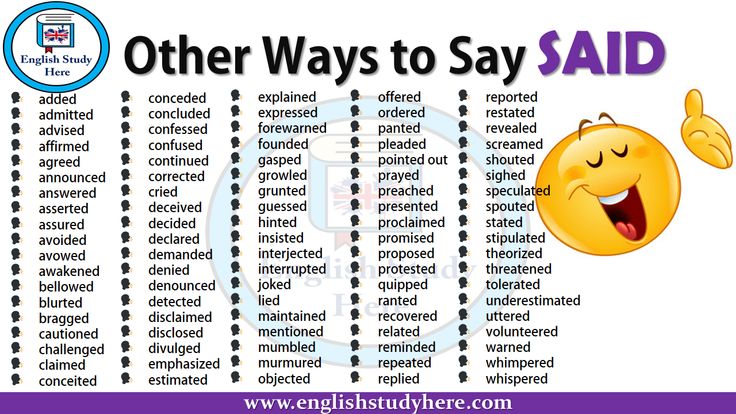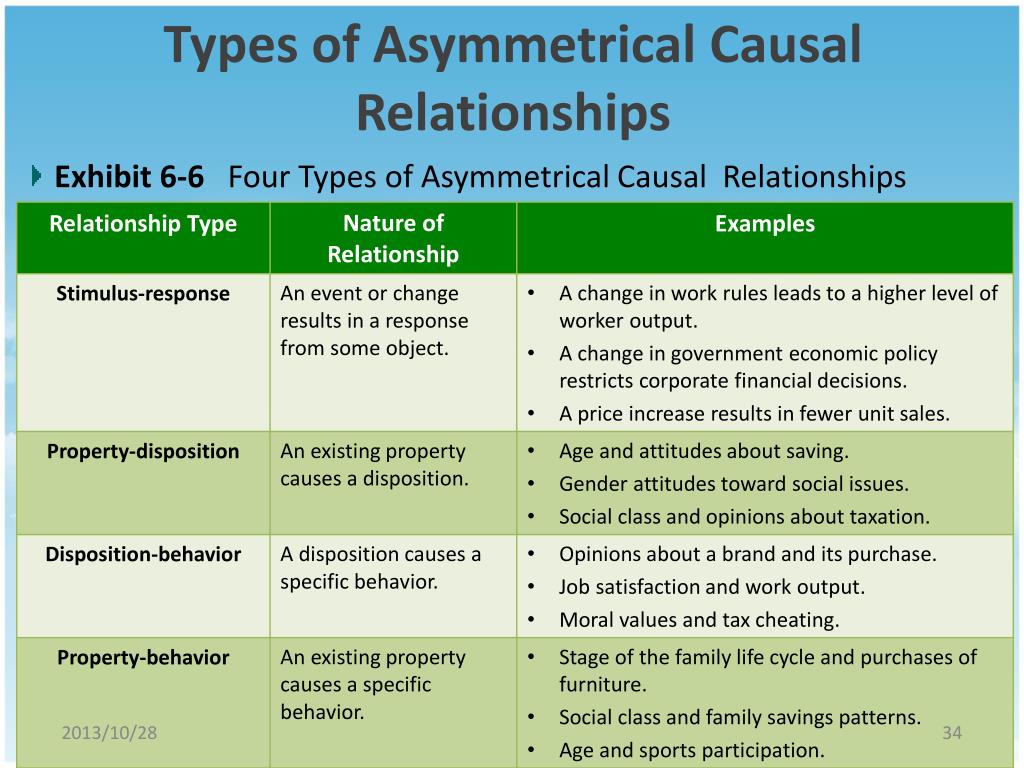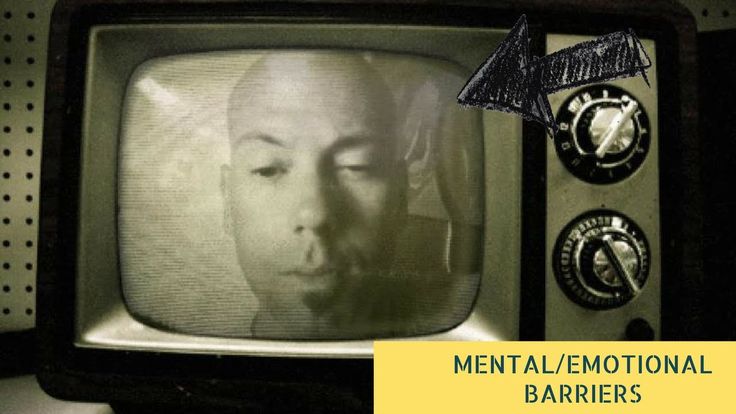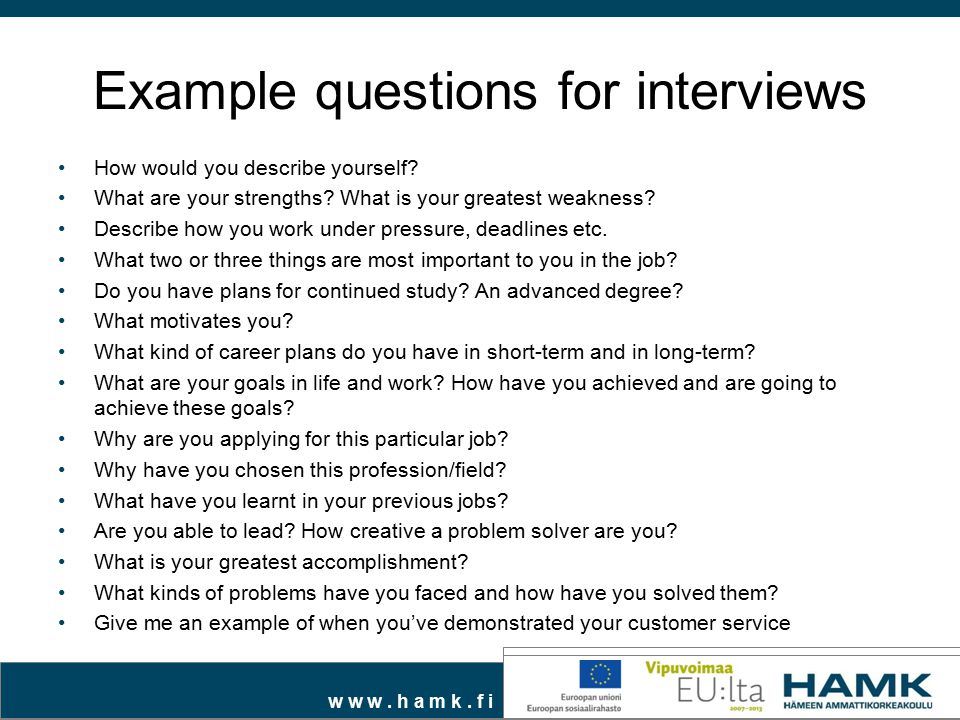Creative ways to say no
99 Ways to Say No
This year, I decided to follow the advice of some smart people and create a word of the year. My word — REST — is my attempt to direct my thoughts, actions, and intentions to be more rested, healthy, and whole.
When I have a choice between X and Y, I remember my word. When I need to make a decision between going out or staying home, I remember my word. When I want to drink another double shot espresso, I remember my word.
Part of the challenge in this is that it has tasked me to say "No" on many occasions when my normally overactive brain and body simply wants to shout "YES!"
Saying NO, as everyone knows, is hard. And so I've been learning to get better at it.
Recently I challenged myself to come up with 50 ways to say NO.
My aim was that each word or phrase should be truthful, firm, and not apologetic or explanatory. (Sometimes I succeeded wildly, sometimes not so much. ) My readers eat up the list, and sent me tons of great phrases to add.
And then, I wondered if I could do better.
Could I come up with 99?
I could. And I did.
99 Ways to Say No
- Not now.
- Look! Squirrel! (This was the best NO suggestion I received from a commentor on my earlier post. I can't wait to use it.)
- My word of the year is REST, so I can’t fit another thing in.
- Nope.
- No thanks, I won’t be able to make it.
- Not this time.
- Heck no.
- No way, Jose. (Since my husband is named Jose, this is a favorite in our house.)
- Regrettably, I'm not able to.
- It's that time of the year when I must say no.
- It's a Wednesday. I have a "No on Wednesday" policy.
- Ask me in a year.
- I know someone that might be a fit for that. I'll email you their information.
- You're so kind to think of me, but I can't.

- Maybe another time.
- Sounds great, but I can’t commit.
- Rats! Would’ve loved to.
- I’m slammed.
- Perhaps next season when things clear up.
- I’m at the end of my rope right now so have to take a raincheck.
- If only it worked.
- I’ll need to bow out.
- I’m going to have to exert my NO muscle on this one.
- I’m taking some time.
- Thanks for thinking of me, but I can’t.
- I’m in a season of NO.
- I’m not the girl for you on this one.
- I’m learning to limit my commitments.
- I’m not taking on new things.
- Another time might work.
- It doesn’t sound like the right fit.
- I'm RESTing right now.
- I’m not sure I’m the best for it.
- No thank you, but it sounds lovely.
- It sounds like you’re looking for something I’m not able to give right now.
- I believe I wouldn’t fit the bill, sorry.
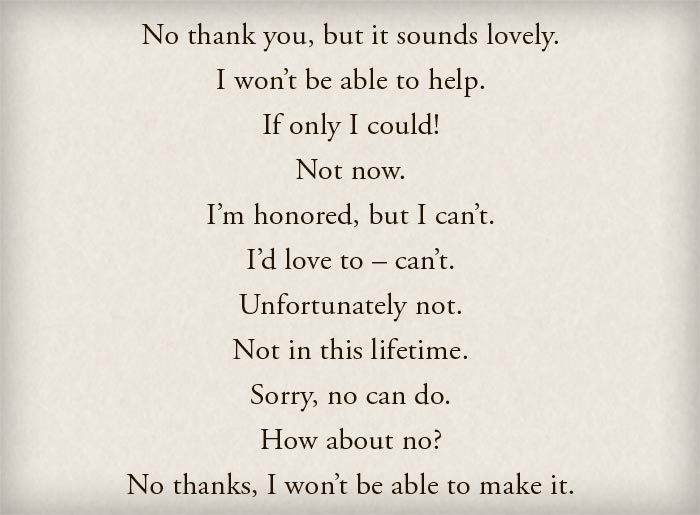
- It’s not a good idea for me.
- Not now.
- I’m trying to cut back.
- I won’t be able to help.
- If only I had a clone!
- I’m not able to set aside the time needed.
- I won’t be able to dedicate the time I need to it.
- I’m head-down right now on a project, so won’t be able to.
- I wish there were two of me!
- I’m honored, but can’t.
- NoNoNoNoNoNo.
- I’m booked into something else.
- I’m not able to make that time.
- Thanks, but no thanks.
- I’m not able to make it this week/month/year.
- Bye now.
- I’ve got too much on my plate right now.
- I’m not taking on anything else right now.
- Bandwidth is low, so I won’t be able to make it work.
- I wish I could make it work.
- Not possible.
- I wish I were able to.
- If only I could!
- I’d love to — but can’t.
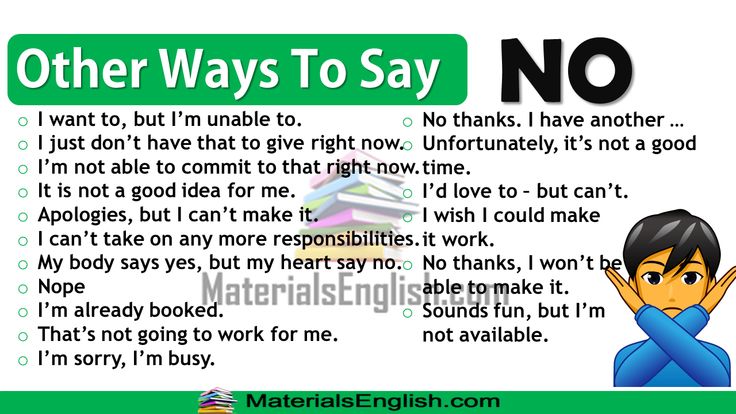
- Darn! Not able to fit it in.
- Nah.
- No thanks, I have another commitment.
- Unfortunately, it’s not a good time.
- Sadly I have something else.
- Unfortunately not.
- I have something else. Sorry.
- Apologies, but I can’t make it.
- Thank you so much for asking. Can you keep me on your list for next year?
- I’m flattered you considered me, but unfortunately I’ll have to pass this time.
- And my favorite, “Oh I wish I could help but you know, I bet Claire could help you with that.”
- Thank you for thinking of me. Unfortunately it’s just not a match.
- No, sorry, that’s not really my thing
- Can I get back to you on that?
- Ew.
- No, I’d rather you didn’t, but thanks anyway
- I can't make it work.
- It just won't fit right now.
- I'm really buckling down on my priorities right now, so I can't.

- No say I.
- What's the compensation?
- How much are you able/willing to pay
- Ick.
- Are you able to better that offer?
- Sorry, no can do.
- I only say yes to very select opportunities, and unfortunately this doesn't meet my criteria.
- The demands would be too much for me.
- It's not feasible for me to take this on.
- I wish I had all the time in the world.
- My body double can.
- In another life.
- I cry, but decline.
- My advisors won't agree to it.
- My body says yes, but my heart says No.
- I'm not the person you're looking for.
- I don't have an iota of bandwidth left in my brain.
- If only.
- N to the O.
- NO.
-
Black Lives Matter
Jun 3, 2020
-
The (almost) 100 Books I Read in 2019
Dec 31, 2019
-
How Two Female Investors are Using Resilience to Innovate the Venture Capital World
Nov 13, 2019
-
The Other 99 Innovators: The Phenomenal Females Forbes Forgot
Sep 10, 2019
-
The Secret to True Innovation? Resilience.
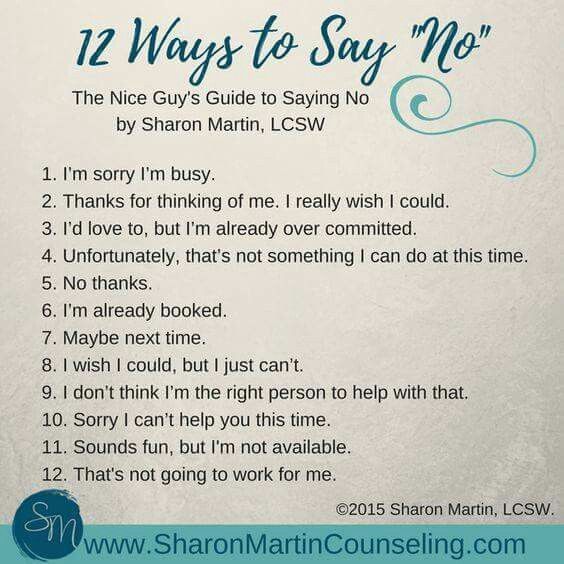 {Calling all Stories from Resilient Innovators}
{Calling all Stories from Resilient Innovators} Jun 12, 2019
-
What is the One Thing You Must Do If No One Else Will?
May 28, 2019
-
Why Transformation is Not a Destination
May 7, 2019
-
The Key to Success that Lasts? Become a Growth Leader.
Apr 30, 2019
-
The One Simple Values Exercise that Every Leader Needs to Do
Jan 15, 2019
-
How to Set Goals that Stick
Dec 15, 2018
Others also viewed
Explore topics
100 Different Ways to Say No - Syd.
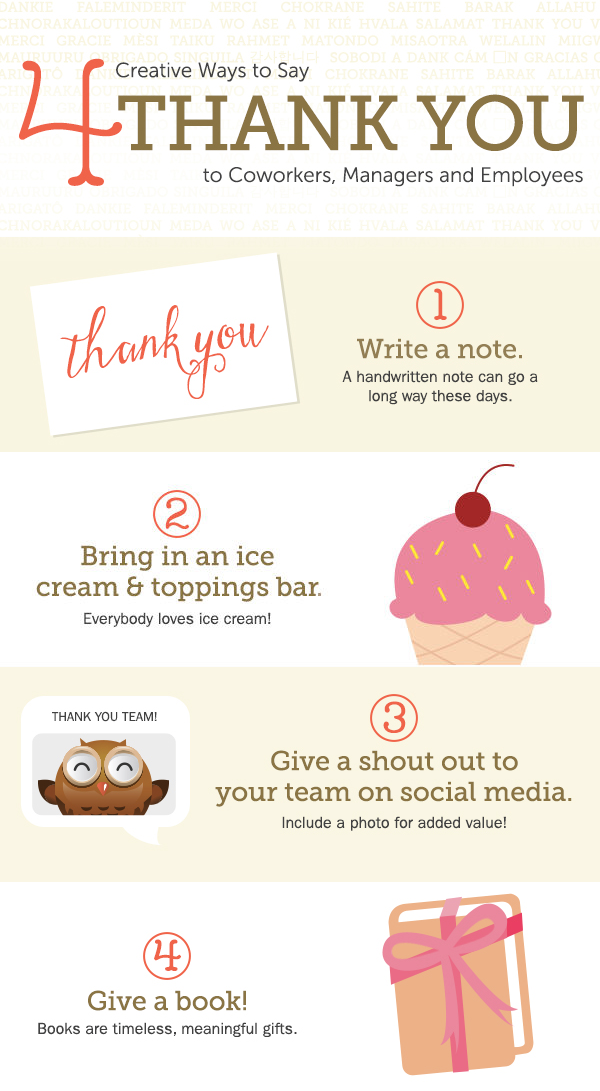 Nord
NordI’m always looking for different ways to say no. Saying no can be hard, but when you’re doing it to say yes to something that means more to you, it’s always worth it. Plus saying no is a muscle that you can strength so it’s easier and easier over time. Here are 100 different ways to say no so you can build that muscle and live your best life!
My name is no, my sign is no, my number is no” — Meghan Trainor
I challenge you to skim through this list of different ways to say no and find a few that really resonate with you. A few that you can actually imagine yourself saying out loud to another human. A few that you can 100% own. Take those few and write them down somewhere so you can see them daily. Your bathroom mirror, your wallet, the front page of your journal or planner. Incorporate them into your life. Practice them! The more accessible these words are when you need them, the more likely you are to practice and strengthen your no muscle.
Plus with 100 different ways to say no, there’s bound to be one that works for you, right?!
Different ways to say no work best when you lead or sandwich your no with good vibes
Because saying “no” is likely not going to feel natural, I like to lead with good vibes or sandwich my no with good vibes so that I can decline with confidence and stay true to my core nature. Some of these different ways to say no examples include a lead or a sandwich and others don’t. Feel free to mix n’ match these options. Take part of one and tack it onto another. This list is just meant to get your brain on the no track. You have to make these 100 ways to say no work for you!
- No, I’m not interested.
- It’s sounds like a great cause, but we are giving to something else this year.
- No, thank you.
- No, I can’t tonight.
- Unfortunately, it’s a not a good time.
- Thanks for asking, but I’m not available that day.
- That sounds like fun! But I’m already committed to something so I won’t be able to join.
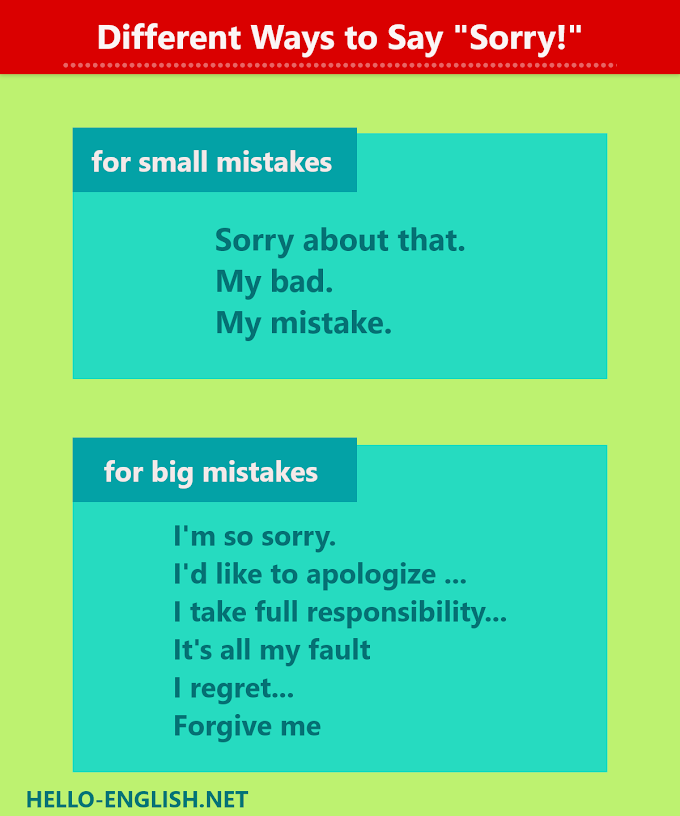
- That does sound like something the kiddos would enjoy! But we’re already committed to something that day.
- No thank you, but that sounds fun, have a good time!
- Thanks for thinking of me, but I can’t.
- I’m not interested, but I can give some thought to who might be interested if that would be helpful.
- No thanks, I have another commitment.
- I wish I could make it work.
- Thanks, but I can’t.
- That’s not really for me, but thank you.
- Sounds tempting, but I have to pass.
- I’d like to, but I know I’ll regret it if I don’t get to bed on time.
- I really appreciate you asking me, but I can’t commit to that right now.
- You know, I’ve been there once and it really wasn’t for me.
- I won’t be able to join this year.
- I have other plans, but thank you!
- I won’t be able to help.
- I’m all set.
- I’m not interested.
- I’m not taking anything else on right now.
- I’m not really into it, but thanks for asking!
- Sadly, I have something else planned.

- Darn! I’m not able to fit that in this week.
- I’m not able to make it this month.
- My plans are already set that weekend.
- Sadly, I have something else.
- That doesn’t work for me.
- Sounds great, but I can’t commit.
- I’m not able to make that time.
- I’ve got too much on my plate right now.
- It’s not possible with my schedule right now.
- I’m trying to honor my family time right now, I can’t commit.
- I have other priorities that are more important right now.
- I’m really working on say no so I can say yes to my family. I’m going to have to say no this time.
- I don’t have time to prioritize that.
- I have to bow out of this one.
- I can’t make it.
- That’s so sweet of you, but I can’t make it work tonight.
- Not this time.
- Thanks for thinking of me, I really wish I could.
- I’m not available.
- That’s not going to work for me.
- No thanks.
- No.

- I’ll pass.
- That’s not my thing.
- We have plans that weekend.
- My schedule is already full.
- Sounds fun, but I’m not available.
- Thanks, but I’m not taking anything else on right now.
- No thanks, I can’t.
- I can’t prioritize that right now.
- I’m not comfortable with that.
- No, I need to focus on other priorities.
- I don’t have the time to dedicate to that right now.
- I’m not able to commit the time I need for that right now.
- I’d rather not, thanks for asking.
- I can’t make it.
- I wish I could make it work.
- I’d love to, but I can’t this year.
- No, I have plans tonight.
- I’d like to help, but I can’t make that time work.
- That time doesn’t work for me.
- That isn’t doable for me right now.
- I know this is important to you, but I can’t.
- Not today.
- I’m afraid that won’t work.
- I’m already committed to something. Best of luck!
- I’m not planning on it.
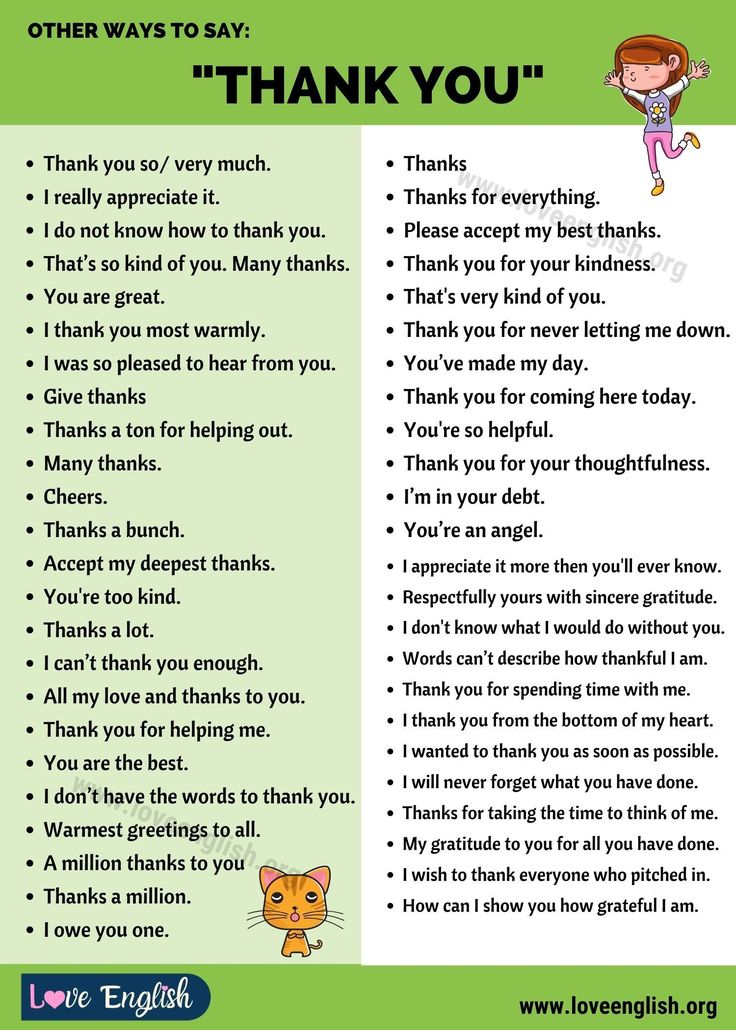
- It’s not on my list.
- No, thank you so much for reaching out to me though.
- Now is not a good time.
- No, but thanks for the invite.
- It means a lot that you thought of me, but I already have plans that night.
- I can’t.
- If only I could, that won’t work for me tonight.
- I need to say no.
- I’m not interested, but I can give some thought to who might be interested if that would be helpful.
- I can’t do that, but I’d be happy to…
- I can’t volunteer for that particular field trip, but I’d be happy to make a snack for the kids to eat on the bus.
- I’d like to help, but I’m not available that week is there another option?
- I can’t tonight, but I’d love to another time.
- Not now, but another time might work.
- Not tonight, but I’d be up for it in the next few weeks.
- Maybe another time.
- I need to take a rain check.
- I can’t, if something changes I’ll let you know.
- I have to bow out this year, but I’ll look into next year!
- Thank you for asking! I’d be interested in hearing more, but I can’t this month.

- I can’t commit to this last minute, can we plan something in a few weeks?
- I can’t this month, will you reach out to me in the spring to ask again?
- Not right now, but I can do it later.
- I’ll let you know when I’m able to do that.
- I can’t this week, but if you reach out to a me a few weeks ahead of time I can get a sitter and make it work!
- I can’t this time, but I’d be happy to join in the future.
WARNING: 83 – 100 of the 100 ways to say no should only be said if you truly would be open to it another time or another way of helping, otherwise you’re just delaying the saying no.
Out of the choices for different ways to say no, my go to ways to say no are:
#9 “No thank you, but that sounds fun, have a good time!”
#10 “Thanks for thinking of me, but I can’t tonight.”
#18 “I really appreciate you asking me, but I can’t commit to that right now.”
#83 “I’m not interested, but I can give some thought to who might be interested if that would be helpful. ”
”
Out of these 100 ways to say no do you have a favorite? Is your go-to not on this list? I can’t wait to hear how you honor your most important yes’s — happy no-ing!
10 Ways to say NO. How to refuse
Is it hard for you to say no? Do you envy those people who easily say this so that no one dares to contradict them? There are several simple ways to help you.
1) State the reason for the refusal. Example: "I'd love to, but..." . It is enough to simply explain to people because many of them simply do not see a reason for refusal, that's all. You do not have to tell the truth, but to say what a person will easily perceive.
2) Change the subject. Example: “By the way, I somehow…” . If you feel that this conversation is not pleasant for you and is not taking the turn that you need, just switch to another topic of conversation. But not too harsh. Cling to other words of the interlocutor, accidentally drop something. Switching to another topic after a few minutes of conversation, say that you need to run urgently, except of course in those cases when the question is already “yes” or “no”.
But not too harsh. Cling to other words of the interlocutor, accidentally drop something. Switching to another topic after a few minutes of conversation, say that you need to run urgently, except of course in those cases when the question is already “yes” or “no”.
3) Sweeten what has been said . Example: "Great idea, but...". Sometimes you are afraid to say no so as not to offend anyone. Therefore, you can say so that a person takes it as a compliment. Tell him about what a great offer, but right now you just can’t. The main thing is that the compliments sound sincere.
4) Call your girlfriends/friends for help. Example: “And speaking between us…” . You are sure that by saying “no” the conversation will lead to an undesirable clarification of what is happening. And this conversation will proceed very rapidly, and you are ready to do anything to avoid this. You do not want to sacrifice your interests and resort to the help of friends who love to interfere in other than their own affairs, having thought out in advance what they will say.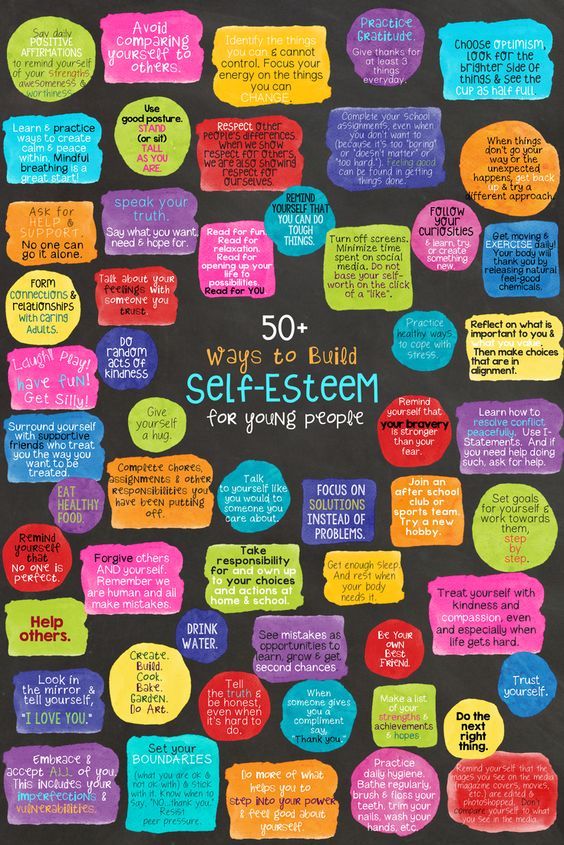
5) You can avoid answering. Example: "Let's see..." . You feel pressured, pushy, and any excuse you know won't help, so just say, "I'll think about it, I'll try."
6) Enlist support. Example: “Only you can understand me…” . Many people react painfully when they are told "no". And it’s hard for them to enter into your position, so when talking with this person from time to time, talk about how busy you are with things, that you don’t have time at all. That the other half does not understand that you did not come on a date, because there was an emergency at work ...
7) Suggest an alternative. Example: “Maybe you should…” . You can disagree, but offer your idea. Offering such an option that will suit everyone, but only such that it is optimal for everyone.
8) Turn everything into a joke. Example: “You see, dear, I would have gone, but yesterday the cat ran away in my shoes and…” .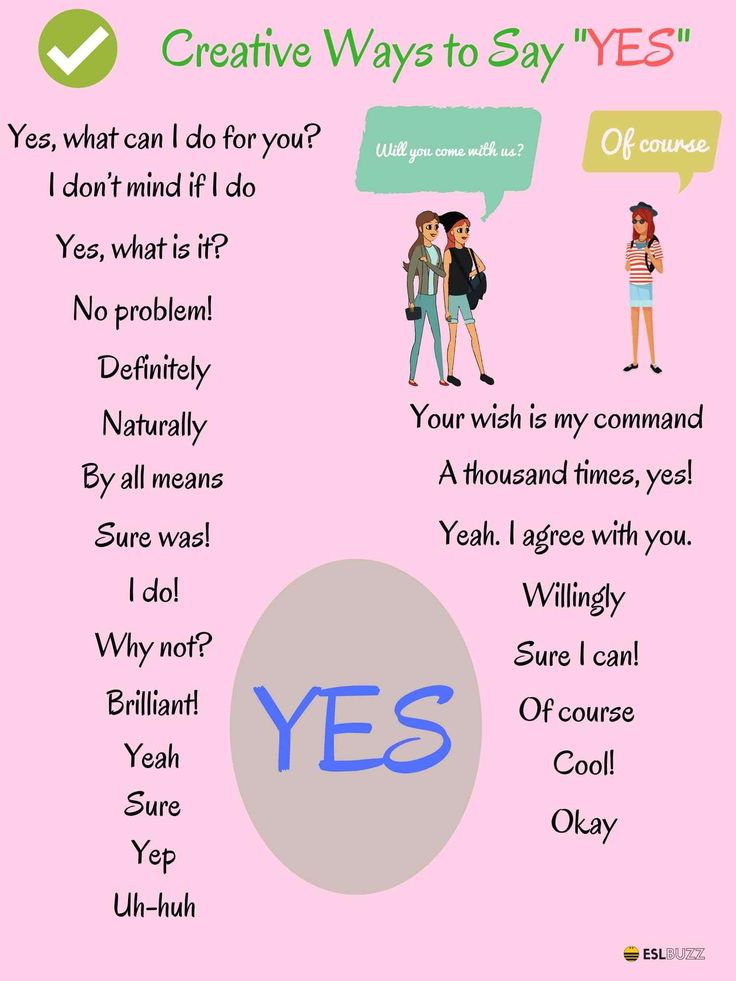 You can fantasize using different options. Just so it doesn't look like you're making fun of the person. Irony must be kind.
You can fantasize using different options. Just so it doesn't look like you're making fun of the person. Irony must be kind.
9) Let the responsibility fall on others . Example: "Well, if you think so..." . Let them think that you have no other choice, and you agree with their opinion.
10) Use other people's tricks. Example: “What do you think…” . The options may be different: “You won’t be offended if ..., nothing, because there’s nothing terrible in the fact that ...?
You arrive at a car service and the mechanic says that the repair will cost only three hundred dollars, after which your expression changes. He asks: "Expensive?" You answer: “What do you think?” Then there is a chance that he will give in to you. Well, if you haven’t found anything suitable, you can just say “no” firmly and confidently.
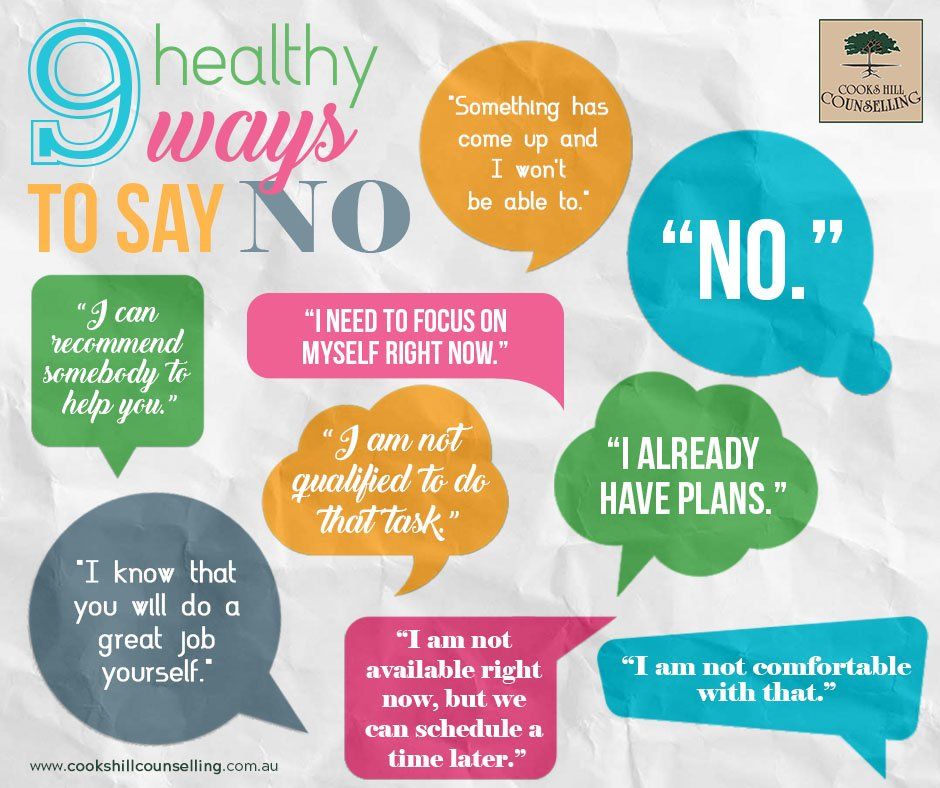
* when copying material reference to the source mirpozitiva.ru is required
Add to favorites
Comment
6 ways to say “no” without feeling guilty | by Lera Petrosyan
Photo source: PixabayWhat is easier: to say "yes" or to refuse a request? Saying “no” is sometimes very difficult, and it doesn’t matter if it’s a close friend or a casual acquaintance.
Fear of destroying relationships, being branded as an egoist or offending a person pushes to agree to any proposals. Even though we know exactly what we want or should be doing, we make time for other people's requests, unwanted invitations, or meaningless tasks.
In order not to wallow in unwanted obligations, not to be a guest of every empty event and not to suffer every time, agreeing to the next request, you need to learn to firmly say “no”.
How? Eric Barker turned to research and identified six points that will unburden your life of unnecessary “yes”.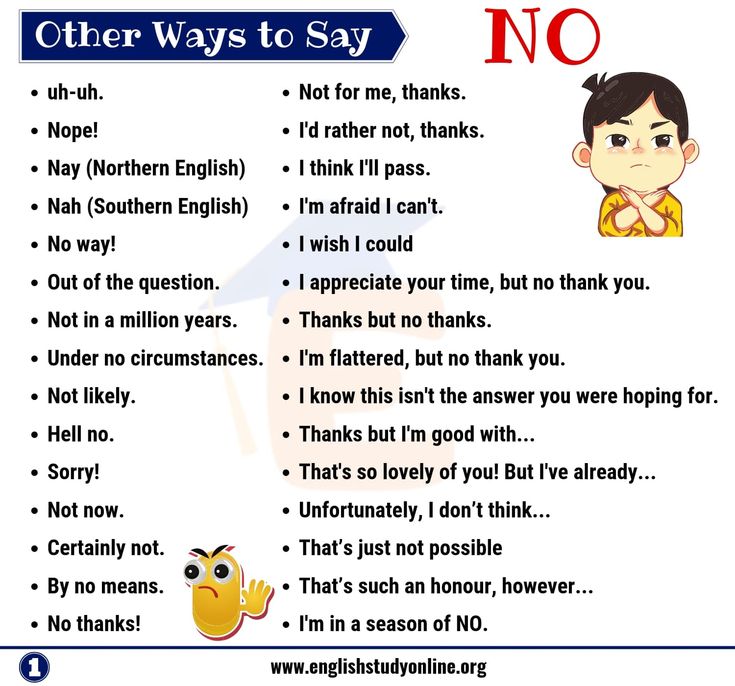
You are asked for a favor, and it seems to you that if you say "no" you will be disliked. And you give in, even if you didn't want to at first. Surely everyone is familiar with this situation.
If you say “yes”, you will be disappointed in yourself, angry or offended by the applicant. Even if you had the opportunity to refuse him.
Research shows that such situations not only create a cycle of negative feelings, they actually damage relationships. Yes, when we are "too nice" that's also a problem.
“The desire to avoid conflict is not an indicator of a successful relationship. Rather, it is a serious symptom of a dysfunctional relationship. It is better to recognize that the emergence of negative emotions between people is a natural process that you must learn to deal with effectively ... If you cannot express negative emotions, the relationship loses sincerity. — Harriet Breaker, The Desire to Please: Healing People from Compliance Syndrome
How can you say “no” without feeling guilty? Experts have found the answer and offer six ways to do this.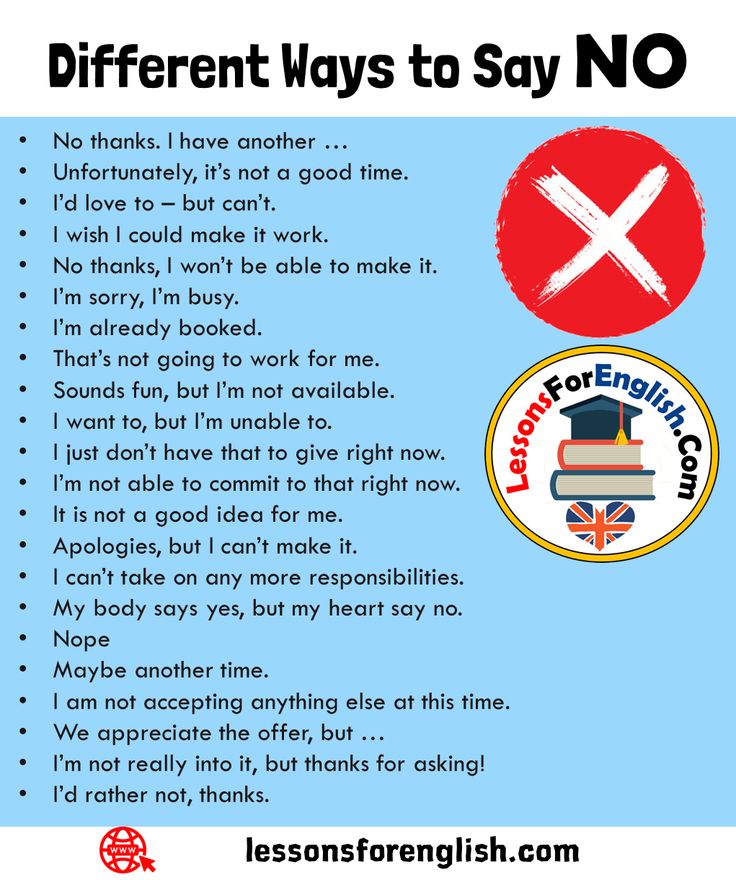
Moments when a person gets angry at your "no" stick in my memory like neon billboards. However, people constantly say “no” and do not suffer any serious consequences after that. The water in the sea didn't turn to blood, and the frogs didn't start falling from the sky. The petitioner just shrugged his shoulders and said, "Good."
You yourself easily forget such refusals, paying attention only to those 0.02% of cases when the other person lost his temper and did not communicate with you anymore.
So try to take a closer look at how other people interact with each other and with you. Notice the times when "no" didn't cause any problems and try to develop a more objective view of the situation.
“Notice how people say no to each other every day. When you start really paying attention, you will notice that this happens all the time. And in most cases it's not something significant. Keep this in mind when it's your turn to say no in a similar situation, or when someone else says no to you.
" - Patty Brightman and Connie Hatch How to say no without remorse. And say yes to free time, success and everything that is important to you.
Observe how others deal effectively with similar situations. When you are polite and benevolent, the likelihood that a person will be angry with you is extremely small.
You should set the boundaries in advance so that you have a good idea of what is acceptable to you and what is not. This will make it easier to make a decision and resist the temptation to say " yes".
“To say no without remorse, you need to really think about your priorities. Why are you saying no? Why do you free up time by eliminating unwanted obligations from life? When you identify and recognize your priorities, you can focus on what you really want. For example, you want to spend time with your family or invest in an important project or goal, and so saying “no” is justified in order to follow your goal.
” - “How to say no without remorse”
All this takes time. But what if someone asks you for something right now? What should be your reaction in order not to reflexively say “yes”, which you will later regret?
"You must respond immediately" is not an inviolable rule of thermodynamics. To be honest, I don't know the fundamental rules of thermodynamics, but I'm sure it's not one of them.
When you feel pressured to say yes, don't give in - buy yourself time, ease the pressure. You will have the opportunity to calm down and assess whether you really want to agree or not.
“To break the habit of automatically saying yes to another person's request, you need to delay the answer and carefully consider your options. The old adage: think before you say (or agree) is an important piece of psychological advice. Once you learn to take time out before giving your response to an invitation, demand, or request, your sense of control over the situation will increase.
” - "The Desire to Please: Healing People from Compliance Syndrome."
What is the best way to do this? Memorize the following phrases and make them your default responses to any queries:
- I need to check my schedule. I'll write you later.
- I need to talk to my husband/wife/partner to see if we have plans for the day.
- I need to think. I will let you know later.
- I'll call you back in a couple of minutes.
Don't make questions out of them. These are statements. Use a polite but affirmative tone.
What if there isn't enough time for you to calm down and be able to comfortably say no?
Now we are back to the question of personal boundaries. When you live by your principles, decisions become easier and people are more likely to respect your answer.
In addition, if this is your permanent rule, there is much less chance that your refusals will be taken with resentment.
“For example, if a friend asks you to lend him money and you don't want to do it, you might say, “I'm sorry, but I have a rule: don't lend.
” This way, your rejection sounds less personal and won't be taken with a lot of resentment." “How to say no without remorse.”
In any case, referring to the rule adds weight and seriousness to your “no”. This implies that you already have experience showing that the action requested is unacceptable to you. In addition, your refusal may imply that you have some prior commitment that you do not want to break. When you refuse an invitation with the words: "Sorry, but in our family we have a rule - every Friday we have dinner together in the home circle," you make it clear to the person that family rituals are above all for you.
True, every rule has an exception. And a persistent person will seek to find a loophole, assuring you that his request is a unique case.
How do you deal with people who don't take "no" for an answer?
First, say that there is nothing you can do to help. And repeat your original answer over and over again.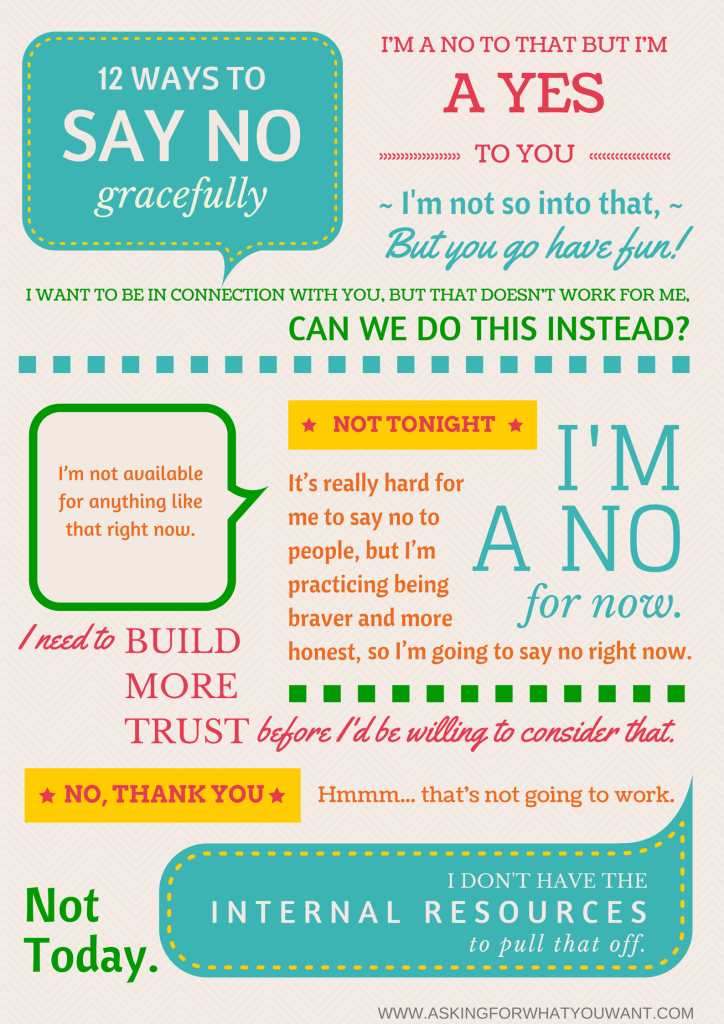
They: Can you help me bury this body?
You: Sorry, I can't.
They: What if we do it tomorrow? You are free?
You: Sorry, I can't.
They: And if we let you use a brand new shovel...
You: Sorry, I can't.
This exercise teaches perseverance. You repeat your refusal over and over again, not reacting in any way to new conditions or introductory ones. Eo does not allow another person to bargain for his own.
Don't get angry or raise your voice. Just calmly repeat the same thing until the interlocutor gets tired.
“Be careful not to answer directly or enter into a discussion about the opponent's arguments. If you stick to your simple answer, the petitioner will not be able to force you to change your position. It is important that you do not enter into any negotiations. This is new territory for you. Don't let yourself be dragged into a state of negotiation where there is a chance that your old habit of please will take over and you will end up saying yes, even if you didn't want to.
" "The Desire to Please: Healing People from Compliance Syndrome."
The broken record technique is effective with salespeople but cold with loved ones. How do you say “no” without it looking indifferent and selfish?
Adam Grant, a professor at the Wharton School of Business, took this method from research: “…it involves referring to promises to other people when you turn someone down. Research by Hannah Riley Bowles and Linda Babcock shows that if we refer to other relationships when we say no, we are well liked because we still appear caring and generous.”
So how do you do it? Your answer should have the following structure: "If I help you, I will let others down." When Adam receives letters asking him to become a mentor, he responds as follows:
“Professionally, my top priority is students. And since I teach over 300 students every year, I don't have the opportunity to be your mentor."
What if you don't want to say a strict "no"? You want to help, but the conditions don't suit you.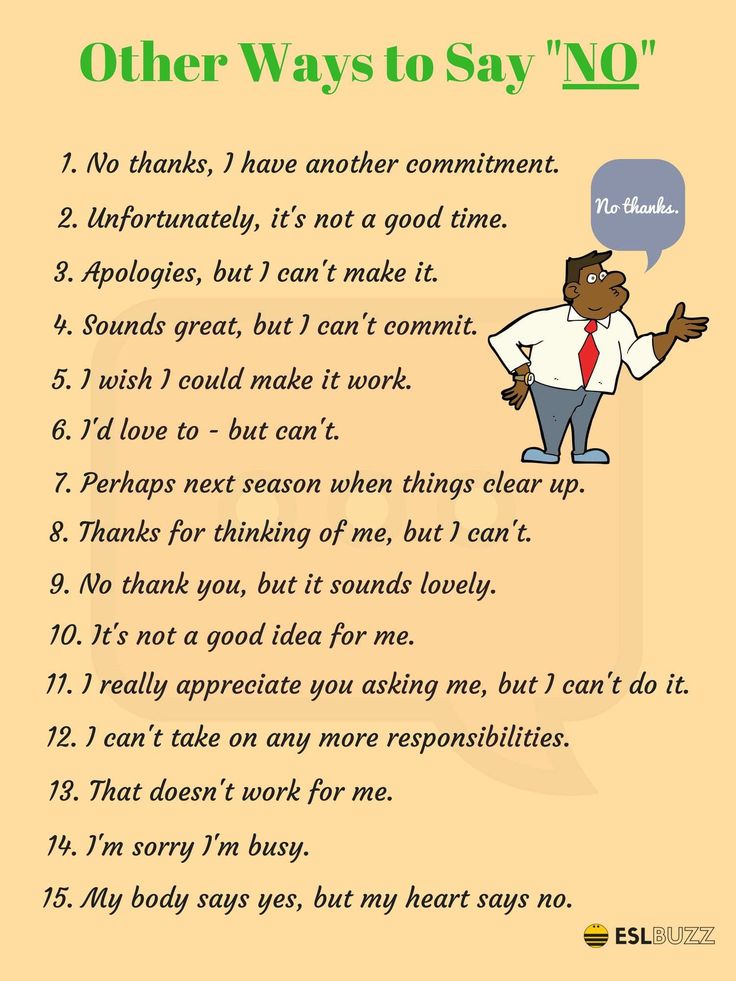 How to proceed?
How to proceed?
You have been contacted by a charitable foundation that is pursuing a cause you support. And they are expecting a $487,000 donation from you. A valid answer is: “No, not at all. But I can give you $10."
“If a friend asks you to volunteer for four hours at an event, you might reply that you can't devote that much time, but you're willing to volunteer for an hour or two. Be careful not to fall into the trap, otherwise you will use this option too often. Save counteroffers for when you really don't want to say no. The reason for not saying “no” should be that you really want to comply with the request, or at least don’t mind, but you need to change the conditions to suit your situation and interests. - “The desire to please: healing people from the compliance syndrome ".
You can always make a counter offer by pointing the person to another resource or person who can help them.
Adam Grant offers a useful example:
- I am not qualified to fulfill your request, but I know someone who can help you.

- This is not my area, but I know who can be useful to you.
Enough theory. Let's recap and recap some good and safe ways to help you master the skill of saying "no" in any situation.
- Pay attention to refusals: “no” rarely leads to revenge or bloody consequences. “No” is not such a risky answer and is more common than you might think.
- Haggle over response time: I'm not sure I can summarize this point right now. I will return to this later.
- Make a "policy": sorry, but it's my rule never to generalize the third point.
- Be a "broken record": I can't generalize this point. I cannot generalize this point. I cannot generalize this point.
- Use footnote to other relationships: if I summarize this point for you, I won't have time to do it for others.
- Counteroffer: I can't generalize this for you, but I can link to another post where it's done.
Using all these techniques with your loved ones, loved ones, friends or boss can be quite dangerous because the stakes are so high.